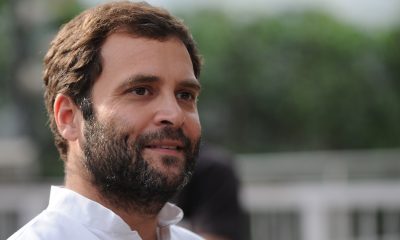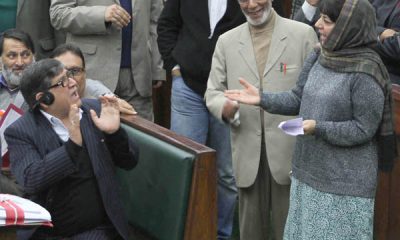World
PDP set to win most seats in valley, Omar shocked

Srinagar: The PDP and the National Conference Tuesday virtually swept the Kashmir Valley though Chief Minister Omar Abdullah was worsted in one of the two places where he contested.
Amid hung assembly predictions, the main contest between the National Conference and the Peoples Democratic Party was confined to the 46 constituencies in the valley.
In the outgoing 87-member assembly, the National  Conference had 28 seats and PDP 21.
Conference had 28 seats and PDP 21.
While the PDP of former chief minister Mufti Mohammed Saeed has made inroads into some National Conference bastions, the latter has surprised the PDP too.
Omar Abdullah’s victory from Beerwah is a shocker to the PDP, although he lost from Sonwar in Srinagar.
The two big surprises for the PDP came from north Kashmir’s Ganderbal district where the National Conference won both seats: Kangan and Ganderbal.
Ganderbal is a traditional National Conference bastion. But the PDP was tipped to win there after National Conference leader Omar Abdullah dumped it for Sonwar in Srinagar and Beerwah in central Kashmir.
The National Conference fielded Ashfaq Jabbar Sheikh from Ganderbal. He was seen as a weak candidate against Qazi Muhammad Afzal of PDP who had defeated Omar Abdullah in 2002, a defeat Omar avenged in 2008.
On Tuesday, Ashfaq Sheikh shocked the PDP by defeating Qazi but by just 432 votes.
Mian Altaf Ahmad of the National Conference, a senior Gujjar leader, was believed to be facing a serious challenge in Kangan. Mian proved pundits wrong by retaining the seat and defeating PDP’s Bashir Ahmad Mir.
In the eight seats of Srinagar district, all won by the National Conference in 2008, the PDP won five: Amira Kadal, Sonwar, Hazratbal, Batmaloo and Zadibal. The National Conference took Idgah, Khanyar and Habba Kadal.
Getting five seats in Srinagar district is a major feat for the PDP. But the National Conference registered its presence for once in Anantnag district where it won the Pahalgam seat. The Congress won from Shangus and Devsar, both of which were held by the PDP.
Another significant victory for the National Conference has been from Sonawari in north Kashmir’s Bandipora district where outgoing legislator and minister Muhammad Akbar Lone won despite apprehensions.
Shia leader and National Conference legislator Aga Syed Ruhullah also surprised the PDP by retaining Badgam in central Kashmir which the PDP was confident of winning.
In the process, the National Conference reached the double digits although many had feared that it was likely to be decimated in the valley.
Forecasts that the PDP would get closer to a simple majority of 44 seats in the 87-member assembly were proved wrong.
PDP senior leader Muzaffar Hussain Baig said it would be a rude shock if his party did not win at least 35 seats, a figure which still eludes the party.
But no single party has managed to win enough seats in the assembly to take power on its own.
World
Lockdowns in China Force Urban Communities to Defy Censorship and Vent Frustration Online

Shanghai’s rich middle class is leading a wave of online dissent over the strict and prolonged lockdowns imposed in various parts of the country. Chinese internet censorship is struggling as patience is wearing thin in many urban centers, coming up with creative forms of online protests.
Social Media Posts Revealing Lockdown Tension in Shanghai
Drawn-out lockdowns are nothing new in China as authorities insist with the nation’s zero-Covid policy since the start of the pandemic. Currently over This time around, however, metropolitan areas like Shanghai are increasingly difficult to keep quiet, given that its more than 25 million residents have seen weeks of total isolation along with food shortages and many other service interruptions.
Dozens of towns and reportedly over 300 million Chinese citizens have been affected by lockdowns of different severity. As expected, urban netizens have been most outspoken over their difficulties by finding creative ways to get around state censorship and bans placed on topics, news comments and spontaneous campaigns.
Shanghai residents have been using mobile proxies and hijacking seemingly unrelated hashtags to talk about healthcare issues, delivery failures and the overall severity of their situation. The “positive energy” that the Chinese government wants to transmit during the recent prolonged series of lockdowns does not come naturally to those counting food supplies and online censors are working hard to filter words, trending topics and undesired social media sharing.
WeChat groups and message threads are under constant monitoring. Posts questioning the zero-Covid approach have been quickly deleted, including by leading Chinese health experts like Dr. Zhong Nanshan. Video footage is soon censored and protests and investigations are quickly made to disappear.
Where this has not worked, officials have exposed banners with warnings and outright threats like “watch your own mouth or face punishment”, while drones have been patrolling the city skies. Yet, if anything, this has led to further tensions and unspoken confrontation with Shanghai’s educated and affluent middle class.
Creative Online Solutions Harnessing Civic Energy
Announcements by Chinese social media that they would be publishing the IP addresses of users who “spread rumors” have not helped either. Tech industry research has shown that much of Asia’s tech-savvy population has a habit of using mobile proxies and other privacy tools, quickly finding workarounds to browse the internet freely and talk to the world about the hottest topics.
The sheer volume of forbidden posts is already a challenge for the very censorship system, experts explain. Unable to track all trending hashtags, state workers overlook topics that speak about the US, Ukraine or other popular news. Linking human rights elsewhere to their situation, Chinese online dissidents establish their informal channels and “hijack” the conversation to share personal or publicly relevant information about the Covid suppression in their town.
Sarcastic and satirical posts still dominate. Others hope to evade the censors by replacing words from famous poems or the national anthem. One thing is certain – social media, when harnessed with the right creativity, has proven its ability to mount pressure on the government in even some of the most strictly controlled tech environments like China.



















